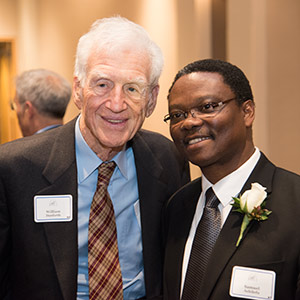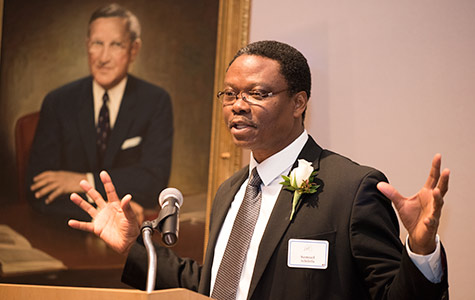
Growing up in his native Nigeria, Samuel Achilefu, PhD, felt the impact of civil war. Fighting forced his family to move to a safer area in Nigeria and start life anew. Achilefu was only about 5 years old.
Now a Washington University School of Medicine professor of radiology, Achilefu recalls something his father wrote on the wall of their new home: “When wealth is lost, nothing is lost. But when name is lost, everything is lost.”
Its meaning, according to Achilefu: “He meant one should be above reproach, that a good name trumps ill-gotten wealth. It set a moral standard that we should follow in life.”
Achilefu’s father has since passed away. But the adage has guided the researcher throughout his life. After receiving a PhD in molecular physical and materials chemistry at the University of Nancy, France, where he attended on a French government scholarship, and postdoctoral training in oxygen transport mechanisms, Achilefu came to St. Louis in 1993 to join the nascent Discovery Research Department at Mallinckrodt Medical Inc. In 2001, he joined Mallinckrodt Institute of Radiology at Washington University.
On Jan. 14, Achilefu’s mother, wife and two teenage children watched as the scientist received the St. Louis Award at the Eric P. Newman Education Center. The honor, awarded almost every year since 1932, recognizes area residents whose achievements reflect positively on the community. Achilefu was recognized for leading a team that developed high-tech goggles that help surgeons “see” cancer.
“Our efforts start with two words: ‘What if?’ ” he said during his acceptance speech. “These words may sound simple, but they embody the belief that each person has the potential to make a difference, if only he or she can take the time to understand the problem.”
Cancer cells are notoriously difficult to see, even under high-powered magnification. Achilefu’s eyewear is designed to make it easier for surgeons to distinguish malignant cells from healthy cells, helping to ensure that no stray tumor cells are left behind during surgery to remove a cancerous tumor. The glasses could reduce the need for additional surgical procedures and the subsequent stress on patients, as well as time and expense.
The goggles system incorporates custom video technology, a head-mounted display and a targeted molecular agent that attaches to cancer cells, making them glow when viewed with the glasses.
“A limitation of surgery is that it’s not always clear to the naked eye the distinction between normal tissue and cancerous tissue,” Ryan Fields, MD, an assistant professor of surgery who has used the goggles with melanoma patients at Siteman Cancer Center, said last year. “With the glasses developed by Dr. Achilefu, we can better identify the tissue that must be removed.”
Viktor Gruev, PhD, associate professor of engineering at WUSTL, and Ron Liang, PhD, of the University of Arizona, assisted with development of the glasses. WUSTL graduate students Suman Mondal, Shengkui Gao and Yang Liu and postdoctoral fellow Nan Zhu also played key roles.
The technology has prompted phone calls from around the world – from surgeons as well as news reporters.
David Kemper, part of the award committee that chose Achilefu, said the researcher was honored “for his passion and commitment to medical research, putting St. Louis in the spotlight for advancement in optical engineering technology and pushing the boundaries of cancer treatment.”
Kemper also is chairman and CEO of Commerce Bancshares Inc. and vice chair of the Washington University Board of Trustees. Past St. Louis Award recipients who attended the ceremony included Washington University Chancellor Emeritus William H. Danforth and John F. McDonnell, a Washington University trustee.
In recognition of the honor, St. Louis County Executive Steve Stenger declared Wednesday Dr. Samuel Achilefu Day.
Julie Margenthaler, MD, an associate professor of surgery, has used the goggles with breast cancer patients at Siteman.
“It’s been very exciting for me to be involved with Sam, not only because it’s a technology we think will change how we treat patients, but because Sam is such a wonderful collaborator,” Margenthaler said. “He understands that his work, ultimately, has the potential to benefit patients. And he wants to do the best he can for them.”
The goggles and a related dye Achilefu and his team developed are undergoing review by the Food and Drug Administration. Achilefu intends to keep Washington University as the primary center for clinical trials to evaluate the technology in patients.
Philanthropist David Wohl anonymously established the St. Louis Award in 1931 to honor those who have “performed such services as to bring greatest honor to the community.”
Said Achilefu: “Making a difference in society should be the goal of everybody.”
